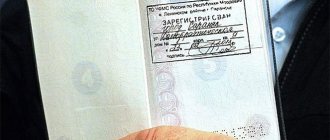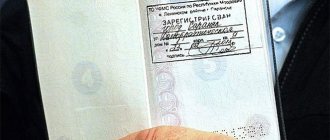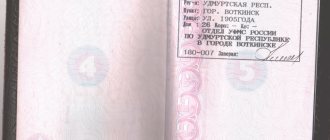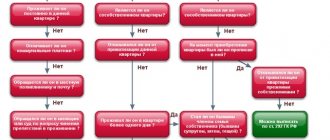Reasons why you need to discharge a person after death
The occurrence of death, from the legal side, entails the termination of all rights and obligations of a person, including the rights to own property. Then the right to dispose and own the property of the deceased passes to his close relatives by will or automatically.
Russian legislation does not establish an exact period when it is necessary to discharge a deceased person from his place of residence, but the discrepancy between documents and reality leads to adverse consequences:
- When selling an apartment, it is necessary that all tenants check out of the residential property, in accordance with clause 2 of Art. 292 of the Civil Code of the Russian Federation (what are the features of the extract when selling an apartment?). When selling, it will definitely turn out that there is one more person registered in the apartment, which will delay the transaction process. There will be problems with the quick and profitable sale of real estate.
- Utilities will calculate utility bills for one additional person. If you do not provide information about the death of one of the residents, you will have to overpay for utility bills.
- If a deceased person enjoyed benefits during his lifetime, it is not uncommon for relatives to deliberately not remove him from the register. In this case, you should remember that all money saved illegally will have to be returned, and in some cases, a fine and penalties will have to be paid.
Why register the deceased from his place of residence?
As soon as a person dies, all the benefits that were given to him during life immediately cease to operate. This also applies to property rights. The person does not exist, therefore, you need to issue an extract from the place where he was registered. It becomes necessary to:
- no extra utility bills were charged;
- it was possible to register new people in an apartment or private house;
- be able to privatize or sell housing.
Therefore, remove the deceased person from the register immediately after receiving the paper confirming the occurrence of death (as a rule, this role is performed by a certificate). This will avoid many difficulties in the further disposal of residential property.
Differences in the extract if the deceased was and was not the owner of the property
- If the deceased was the owner of the apartment , then after his death the question of inheritance arises. In this case, there is no need to rush to remove the deceased from the apartment, since the new owner can register the right to the property only after six months. As the new owner, he will be able to deregister the deceased.
- If the deceased was not the owner, then the deregistration procedure is simple. The homeowner has the right to register and discharge other citizens into his apartment at any time, including in the event of death.
Afterword
The death of a loved one is a sad event, but despite the grief, one should not forget about the correctness of the procedures. This is necessary to avoid further problems and to discharge the deceased person from a private house or apartment according to the rules.
What else to read:
- Detailed instructions for counting votes at the general meeting of owners (GMS) of an apartment building (MAD) in 2021
- Invalidation of the minutes of the general meeting of owners of apartment buildings - criminal liability for forgery according to the Criminal Code of the Russian Federation
- Can they be evicted from a service (departmental) apartment in 2020 if there is no other housing - grounds, conditions, procedure for eviction according to the Housing Code of the Russian Federation
- How can parents (owners) expel a registered adult child (son or daughter) from an apartment without his consent?
Procedure for de-registration
Let's look at step-by-step instructions for discharging the deceased from an apartment, what documents relatives need and which authorities to contact first.
You can find out about the general procedure for deregistering any person from the place of registration here.
Application deadlines
The deadline for applying for deregistration of a deceased person from a home is not established by law. In each individual case, the issue of discharging a deceased relative is individual.
In order not to overpay for utility bills and to avoid difficulties with selling an apartment, it is better not to delay the application.
To discharge a deceased person from an apartment through MFC branches, there is a certain deadline for applying. We will consider the discharge procedure through the MFC in more detail below.
Institutions
Deregistration of people from their place of residence, including the deceased, is carried out by authorized government bodies and institutions. Relatives can write out a deceased relative :
- Through the local unit of the Ministry of Internal Affairs for migration issues. According to another UVM.
- By contacting the Multifunctional Center - MFC.
- Remotely through the State Services website.
Required documents
Depending on the authority to which relatives apply to discharge the deceased from the apartment, the following documents are required:
- Passport of the applicant and passport of the deceased relative.
- Documents confirming the death of a citizen: death certificate and death certificate. In cases where a death certificate cannot be provided for legal reasons, the interested person has the right to obtain confirmation of the citizen’s death through the court.
- A document certifying the relationship with the deceased: marriage certificate, birth certificate, adoption certificate, etc.
- Documents for the apartment: purchase and sale agreement, extract from Rosreestr, certificate of ownership, etc.
Methods for obtaining documents
The initial document that relatives need to receive is a death certificate . Obtaining this certificate depends on the place and circumstances of the person’s death:
- A certificate is issued at a medical institution if the patient died in the hospital.
- In the morgue, if the person’s body was taken there for identification, autopsy or extradition.
- If a person died at home, then a certificate can be obtained at home from the ambulance crew who responded to the call and pronounced death.
A person's closest relative has the right to request a certificate of death. But there are cases when the deceased had no relatives, or his relatives do not know about his death.
In this case, other authorized persons have the right to receive a death certificate:
- if the deceased performed military duty, then the commander of the military unit has the right to receive a certificate;
- a certificate can be obtained by a social service employee if the deceased single person was cared for;
- if a person’s death occurred as a result of a crime, then an employee of the investigative authorities has the right to receive a certificate;
- If a person’s death occurred in prison, then the certificate can be obtained by employees of the correctional institution where the sentence was served.
The next document required to discharge a person from an apartment after death is a death certificate . To obtain it, relatives need to contact the registry office at their place of residence. The Civil Registry Office issues a certificate based on:
- death certificates;
- passports of the applicant;
- passports of the deceased;
- marriage certificate, birth certificate or other document certifying relationship with the deceased.
The deceased person's passport remains in the registry office . Next, the passport is destroyed.
Filling out an application
Once relatives or interested parties have the necessary documents for discharge, you can begin the procedure itself. An application for deregistration is written in the prescribed form. There are no distinctive features when filling out the application. The application is submitted to the territorial office for migration issues.
Difficulties that may arise upon discharge
Despite the simplicity of the procedure for discharging a deceased person from a residential premises, sometimes some difficulties occur:
- Deliberately delaying the process.
This happens if there are some squabbles between the heirs. In this case, someone, for example, will receive a death certificate, but will not give copies of it to others (paying for a duplicate document or solving the problem through the court will help here), as well as perform other actions that delay the process. - Difficulties in declaring a person deceased.
This can happen if he does not appear at his place of registration for a long time. If such a person was declared missing, then his close people can go to court only after 5 years to declare him dead. And only then will it be possible to proceed with the discharge. - Fuzzy stamp on the death certificate.
If the seal that covers the official’s signature does not clearly show the name of the organization that issued the certificate, subsequent actions may be refused. - Extract too late or lack of necessary documents.
These reasons can also delay the process of deregistering the deceased.
Cost, terms, results
Filing an application to deregister a citizen due to death is free. The state does not provide a state fee for this procedure. The deregistration of the deceased will be carried out by the authorities in 3 working days .
Extract from housing may be required in many cases: selling real estate, moving, etc. Find out whether a person has the right to be discharged somewhere and what to do if there is no place where they can register.
Statement
To officially discharge a deceased person, you must draw up a correct application according to the following scheme:
- Indicate the name of the authority and the full name of the head of the MFC.
- Enter the data from the document confirming the identity and information about the person who is applying.
- Write a request to deregister a person due to death. In the same column, you must accurately indicate the address of the location of the real estate object.
- Death is prescribed as the reason for filing the application.
- At the bottom, the document is endorsed with the applicant’s signature and the date of formation is indicated.
Features of the procedure
In addition to the management of migration issues, a separate division of the Ministry of Internal Affairs of the Russian Federation, other authorized bodies also deal with the removal of deceased people from registration. The withdrawal procedure through the MFC and the State Services service is simple.
Through MFC
To deregister through the MFC, you need to go to the nearest branch and get to an employee on a first-come, first-served basis. To save time, you can make an appointment by calling a direct number or calling the hotline.
The withdrawal procedure through the MFC is as follows::
- appear on the appointed date with the required documents;
- submit an application for deregistration of the deceased in the prescribed form;
- receive a receipt from an MFC employee confirming acceptance of the application;
- receive confirmation of withdrawal.
Through State Services
The State Services service allows citizens to use all services of government bodies electronically. Deregistration of a deceased relative is also included in the list of government service options.
For discharge it is necessary:
- Have a registered account on the portal. If it is not there, then registration will not take much time.
- On the portal website, go to the section “Catalogue”, “Registration” and “Deregistration”.
- Fill out the electronic application form.
- Select the nearest MFC branch to confirm your statement.
Contacting a utility service
In order not to pay an extra tariff for utility bills, you must contact your local utility service with an application for tariff recalculation. To do this you need:
- draw up an application for recalculation using the management company’s form;
- provide your passport, confirmation of an extract from the place of residence of the deceased received at the passport office and the death certificate of the deceased.
The utility service is obliged to recalculate from the date of death of the citizen.
If you doubt the tariff recalculation, you can check the number registered in the apartment in the next payment. If there is one less person in it, then the procedure was successful.
Recalculation of housing and communal services
In order not to give money for the service of resource-supplying organizations that were accrued from the moment of the person’s death, you should visit the housing office.
You must take with you:
- death certificate;
- an official document from a medical institution or morgue with the doctor’s signature and seal.
The certificate contains information about the date of death. These are sufficient grounds to recalculate.
The institution will need to draw up an application requesting conversion. The operation must be completed within five business days from the date of submitting the papers and generating the application.
Reasons for refusal
Government authorities will refuse to allow citizens to register a deceased relative if they do not prove their relationship with the deceased . If it is not possible to provide the required documents, then the relatives will have to prove their relationship in court. Based on a court decision, relatives can re-apply to institutions.
If the deceased made a will during his lifetime, in which he indicated another person, not a relative, as the heir, then the heir may have problems with the registration of the deceased. Relatives, as a rule, are not interested in providing the heir with a certificate.
The Migration Department may independently request confirmation of the death of citizens through the registry office if a death certificate is not provided.
Case practice
A citizen applied to the capital's district court to declare her husband dead. During the consideration of the case, it was established that he went to work in Spain in 2008, a year later messages from him stopped coming, letters and calls for 6.5 years did not give the desired result.
The court reviewed the case materials, attached documents according to correspondence, and decided to send a request to the Russian Embassy in the Kingdom of Spain. The response to the request came three months later, it was established that the husband lives in Barcelona, and his contact information was provided. On this basis, the claims were denied .
What happens if a person is not discharged after death?
The legislation of the Russian Federation does not establish any time limits for the discharge of the deceased . This means that the state cannot impose a fine for failure to register. However, the relatives of the deceased may not specifically write it out if the deceased enjoyed benefits during his lifetime. In this case, the state has the right to impose a fine and demand reimbursement of the amount saved on taxes and utility bills.
Removing a deceased person from registration is a common legal procedure that must be performed after the death of a citizen. As a rule, the deceased’s relatives are responsible for extracting the deceased from his place of residence. The legislation is not burdened with time limits for citizens to request deregistration of a deceased person. Delaying the deregistration procedure threatens to overpay utility bills and legal difficulties with real estate transactions.
Certificate
The death certificate is issued by the civil registry office.
The same persons who received the death certificate can apply there.
The law limits the period for obtaining a certificate to three days from the date of receipt of the death certificate. The certificate is issued on the day the application is submitted.
In legal terms, a death certificate, along with a court decision, is a document confirming the termination of all civil and legal rights and obligations of a deceased citizen .
Documents required to obtain a death certificate:
- Passport of the deceased;
- Passport of the person who will receive it;
- Documents confirming relationship with the deceased;
- Death certificate.
There is a small nuance in obtaining a death certificate. If you are a relative, but cannot prove your relationship with him, you will have to prove it.
To do this, in the registry office you will have to consistently restore the entire chain of family relationships. This will take time and cost money. But you may need these documents later.
You may be interested in an article on how to register in an apartment; you can read about it here.








